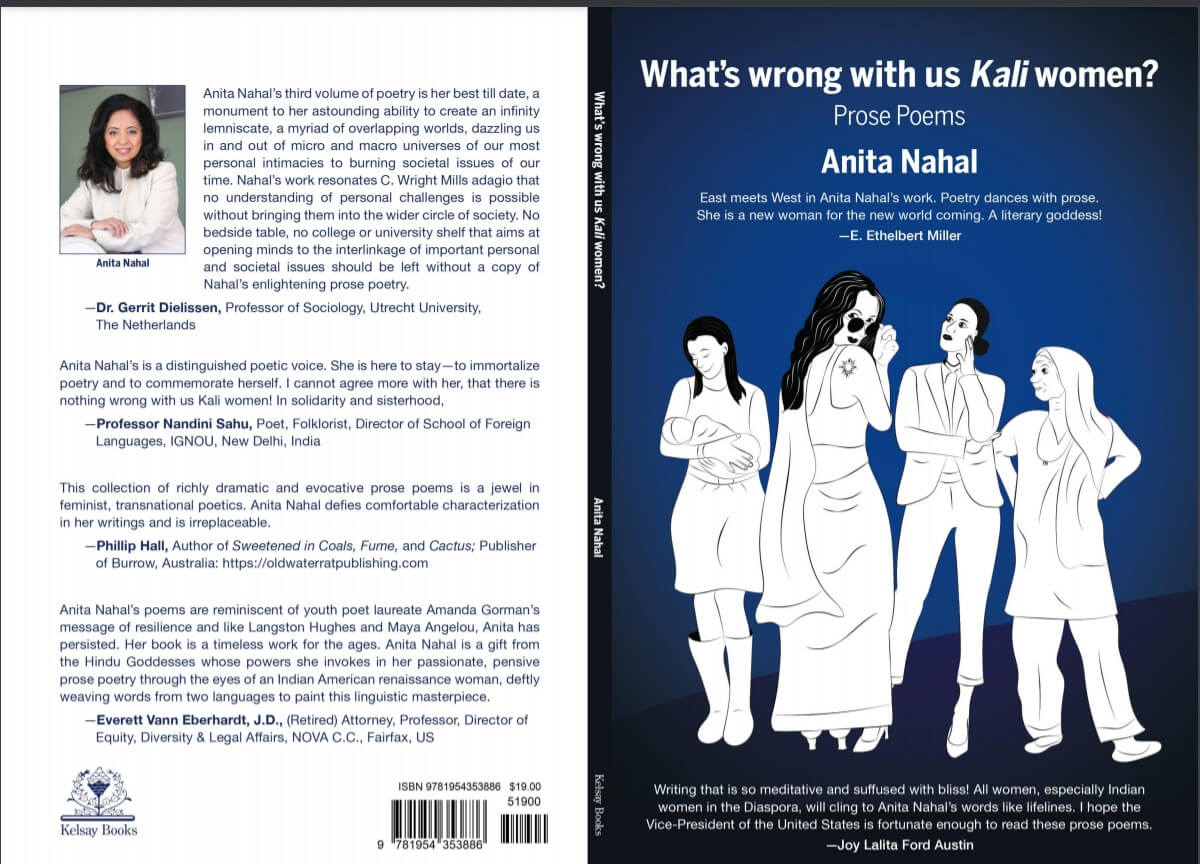Megha reviews Anita Nahal’s What’s Wrong with us Kali Women. An exclusive for Different Truths.

This riveting collection of seventy prose poems exposes the artful mastery of lyrical intensity seeded in Nahal’s poetic craft through which she brilliantly brings out the spectrum of human emotions. The poet speaks with razor-sharp clarity and a deep understanding of the topics ranging from feminism, immigrant, motherhood, racial/gender-based discrimination, and sexual violence against women.
The deep exposition of the complex and layered understanding of the human’s emotions is masterfully portrayed in this collection. Nahal’s sensitivity to human emotions coupled with her poetic craft brings out this collection of prose poems to the readers. She portrays the misogynist nature of society towards women and strips it of its disguises through her words for the whole world to see.
Debunks Myth
The brilliant collection opens with a powerful prose poem “What’s Wrong with Us kali Women” where she debunks the myth of the goddess to be a metaphor of kindness and forgiveness. She also speaks directly to the double standards prevailing in the patriarchal society where the goddess is being worshipped and the women are being violated in the same breath. The poet renders the timely assurance to the readers that the strength we need dwells within us and there is nothing wrong with us women. She calls out the brazen behavior of men in the society worshipping the goddess Kali and abusing the woman in the same breath through her razor-sharp words. The author requests the readers to identify such behavior and with a clarion call through her poems demands this to be nipped in the bud.
Through her second prose poem, “Homo sapiens and Hindu goddesses in India and America”, Nahal demands the women to be treated with the same request and equality rather than to be put on a pedestal and being worshipped like a deity.
This collection is a deep exegesis of the emotion where the woman is put on a pedestal and stripped from worldly desires…
This collection is a deep exegesis of the emotion where the woman is put on a pedestal and stripped from worldly desires thus creating a chasm between the desires and reality.
Through her poems like “Spilt milk in native and foreign lands”, “Paying my debts in two lands”,” and There’s a hole in my heart but my heart is whole”, She portrays her journey from India to the United States as a first-generation immigrant that infused the sense of perseverance and resilience in her. The journey that finally made her the embodiment of strength and survival for her son, her inspiration.
Fecundity of Emotions
Invariably in her collection she also brings the pain of losing a parent to terminal disease and the pain of living apart from them through her poems like “I did not say, I love you to my mama”. She poignantly brings out the fecundity of emotions birthing in an immigrant mind.
Nahal tugs at the heart through her various poems namely “Tequila and spice memories” “Forgotten musical instruments: No words for our music”, representing many first-generation immigrants that are caught between the struggles of making a life in a foreign land and living in the nostalgia of a place they once called home. Through many of her poems, like “Claustrophobia”, she brings us back to the nostalgia and the pain simmering in the heart of an immigrant going back to revisit their roots occasionally.
Her poem “Gandhi Chaddar” reflects on the woes and the struggles of the many caught between the partition of India and Pakistan…
Her poem “Gandhi Chaddar” reflects on the woes and the struggles of the many caught between the partition of India and Pakistan, with their legacy floating between the borders soiled with blood and nostalgia spanning the two nations suffering from displacement and migrations of millions.
Her poems dazzle with vivid imagery and metaphors and bring forth the pain of angst and pain suffered by the women subjugated by the rules of the patriarchal society for generations. The collection poses a deep poignant question to every single woman in the society facing the challenges. The one who is feverishly trying to make their space in this world and trying to speak their truths. The collection presents itself with a question to these women who are compared to the Goddess Kali, a great dissenter.
Systemic Oppression
Nahal also addresses the deeply rooted systemic oppression of the African American communities and other minorities through her poem “How easy for the black Life to be Taken”. She brings out the atrocities and the systemic oppression faced by the African American community for generations under the guise of deep system oppression and brutal police violence. The violence finally paved the way for the Black Lives Matter movement that galvanized the whole country and the world. The poem brings out the horrid emotions that go through the mind of a black person when his life is slowly inching away from them. Through the deep-seated satire in the title, the poet brings out the pain and angst faced by the black community for generations.
No creative collection born during a pandemic can remain untouched by the effect of the pandemic on us.
No creative collection born during a pandemic can remain untouched by the effect of the pandemic on us. The pain the whole world has witnessed for the last 14 months living their own version of life isolated from their loved ones in their own islands of reality.
Nahal’s poem “Breathe” through her masterful words talks about the haunting reality and the necessity of breath, a testament of life, and how that basic privilege is also denied to some. Through the poem “What Happened to their clothes” brings out the deeply seeded sorrow and the fear of dying alone in the pandemic.
Callous and Indifferent Nature
In “Corona and love-life layers”, “The crystal ball is “sick and tired”, “Teaching chair yoga at an assisted living home” Nahal uses the poems to reflect on the indifference of human beings to the suffering of others in times like pandemics. The poems reflect the callous and indifferent nature of humankind to which history has been a witness. Through poems like “The ghost of COVID19 roaming the corridors of organizations”, the poet reflects how the pandemic has churned out and brought the biases like gender and religion to the surface bringing forth the dark face of humanity. “Hold on, baby, we’ll soon be home” reflects the resilience in the face of atrocity by humans in these trying times.
Nahal also tackles the sensitivity and the erotic nature of love…
Nahal also tackles the sensitivity and the erotic nature of love through her poem, “A Sip of Wine” a poem about needs, wants, and desires which tug at the human heart and bring our vulnerable nature towards love. In “Sleepless Nights” the poet gorgeously describes the effect of the night on her and her transgressions. She takes on a journey undulating between the lull and storm and how it leaves a riveting effect on her. Another poem, “It’s Not all about Sex” brings out the deep sensitivity that should be an integral part of a marital relationship and the poet uses the metaphor of sloth to capture this sensitive emotion. Often the lack of this understanding leads to marital discord. Through her brilliant use of the poetic craft, Nahal presents this to her readers.
Through her poems “Chase Away Demons Left Behind,” Nahal speaks about the inner turmoil and the tribulations we often go through in our lives, and she proudly mentioned “The trident in my hand did not fall. Neither did my grace.” which is a brilliant testament to her resilience during the testing times.
… Nahal talks about the insensitivity in bracketing the women’s desires as per her age.
Through the sharpness in her words, Nahal talks about the insensitivity in bracketing the women’s desires as per her age. Through her bold declaration with her poem “A woman’s age is kicking and alive,” “Babylon, my sinful dance muse,” “Finally She showered,” “And then the pundit asked for my son’s father’s family name,” she packs a punch to the naysayers in the society trying to define the cookie-cutter rules she aggressively denies following.
Her poem “Democracy in Decline” is a deep exposition of the failing state of democracy in our country where food and health care are privileges but owning a gun is considered a constitutional right. The immediacy and the tenderness in her words describing the pain are brilliant.
Masterful Wordplay
The poem “Blues of a strong Indian woman in a mid-America small town” is yet again a brilliant wordplay that depicts the fecundity of the emotions the mind and the body go through because of being a first-generation immigrant. With masterful wordplay, she brings out the juxtaposition between the patriarchy and feminism in her poem “Diasporic feminism’s lovemaking”. She also addresses the brutalities of child marriage and the abuse followed through a homage poem to the infamous “Bandit Queen, Phoolan Devi”. In her poems, “Holika, Sita, and Sati” and “Fire couldn’t stop laughing”, Nahal compares and contrasts the misogyny deeply seeded for eons in our traditional Hindu systems where the burden of responsibility always shamelessly falls on the woman.
Nahal brings out the strength and effervescence in womanhood through the following brilliant lines in her poems:
“I want to feel grounded when I lay down…unforgettable So, I chose to be me. A woman. Earthy and sensual.” (Excerpt from Maryada and modern Draupadi)
“Strength of a woman can be underrated like bamboo sticks that hold immense weight in muddy backwater canal hutments.” (Excerpt from the poem “Bandit Queen, Phoolan Devi”)
There are many stunning poems in the collection…
There are many stunning poems in the collection but a few of my favorites are “Holika, Sita, and Sati,” “What’s Wrong with Us Kali Women,” “Sleepless Nights,” Maryada, and modern Draupadi,” and “Bandit Queen, Phoolan Devi. Other favorites from her collection are the “I did not say, “I love you to my mama,” and “Fallacy of a single, immigrant mom,” Another favorite of mine is “Rape”, where Nahal points out the atrocities of gang rapes and mutilation that followed. She fiercely points out that the onus of this sexual violence against women falls on the shoulder of parents to a certain extent.
“Why do parents not teach their sons that another human body is as important and sacred as theirs? Period. Full stop. (An excerpt from the poem)”
Subjugation of Women
The author, through her sharp choices of words, stresses the fact that misogynistic rules have been used to subjugate women for generations in a patriarchal society. The poems bring forth the sensitivity of the poet as an author, a woman, an immigrant, a single parent, an activist, a feminist, and above all as a human being. Nahal brings out the beauty of her diasporic poetry through poetic brilliance and strings her global and local experience as a literary treat for her readers.
Overall, the poems in this collection speak to the readers through their brilliant perspectives and leave the readers with profound questions much after they read. I highly recommended this collection of prose poems and to my readers for a thoughtful read. Nahal brings out the beauty of her diasporic poetry through poetic brilliance and strings her global and local experience as a literary treat for her readers.
Cover sourced by the reviewer





 By
By
 By
By
 By
By
 By
By
Thanks so much, Arindam Roy for publishing the review and supporting the works of the creative artists in the lit community.
It’s our avowed mission to promote literature and literary works, Megha. You are most welcome.
Thank you so much for the fabulous review of my book, Megha! And thank you so much, Arindam Roy for giving the review such a warm welcoming space in your journal!